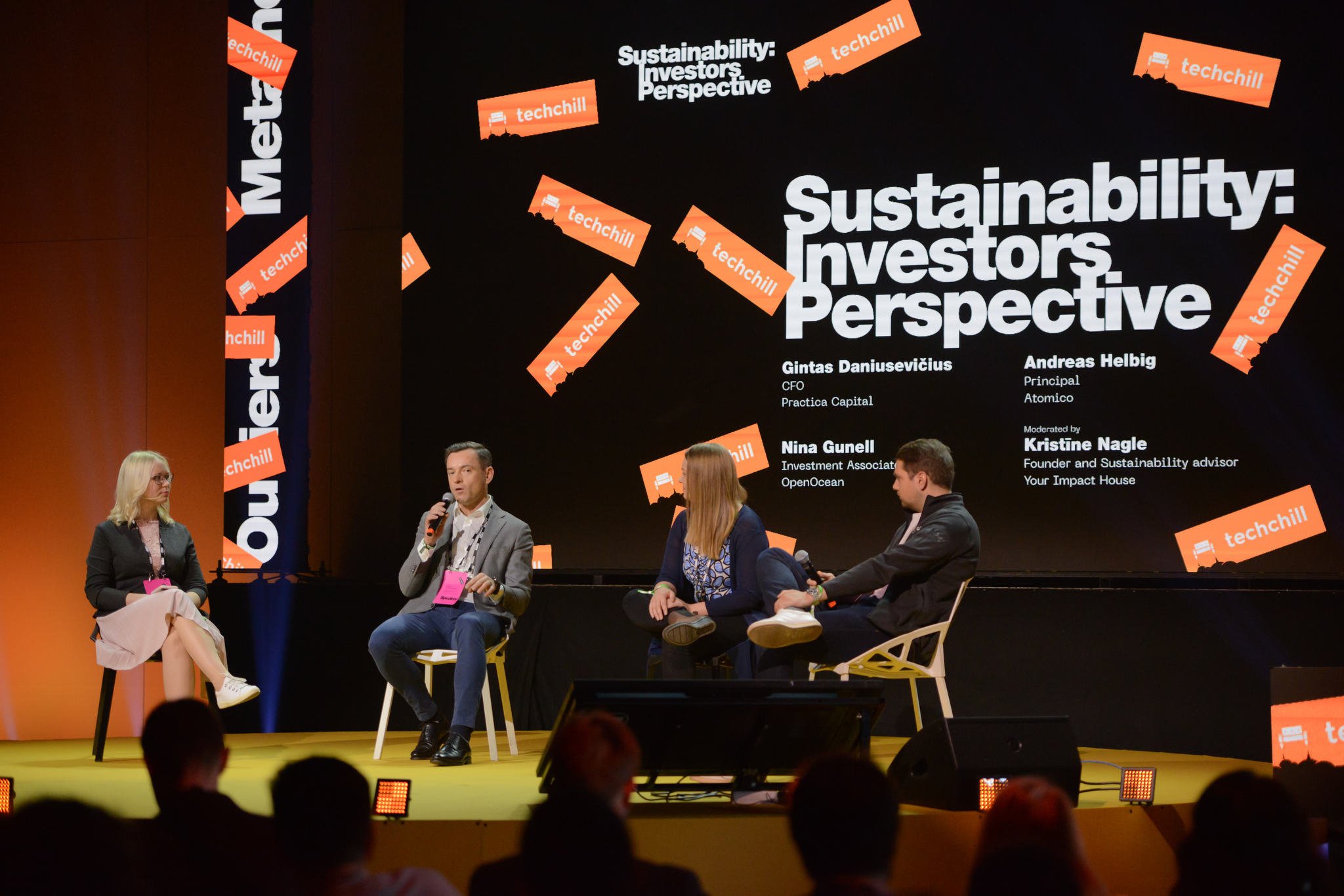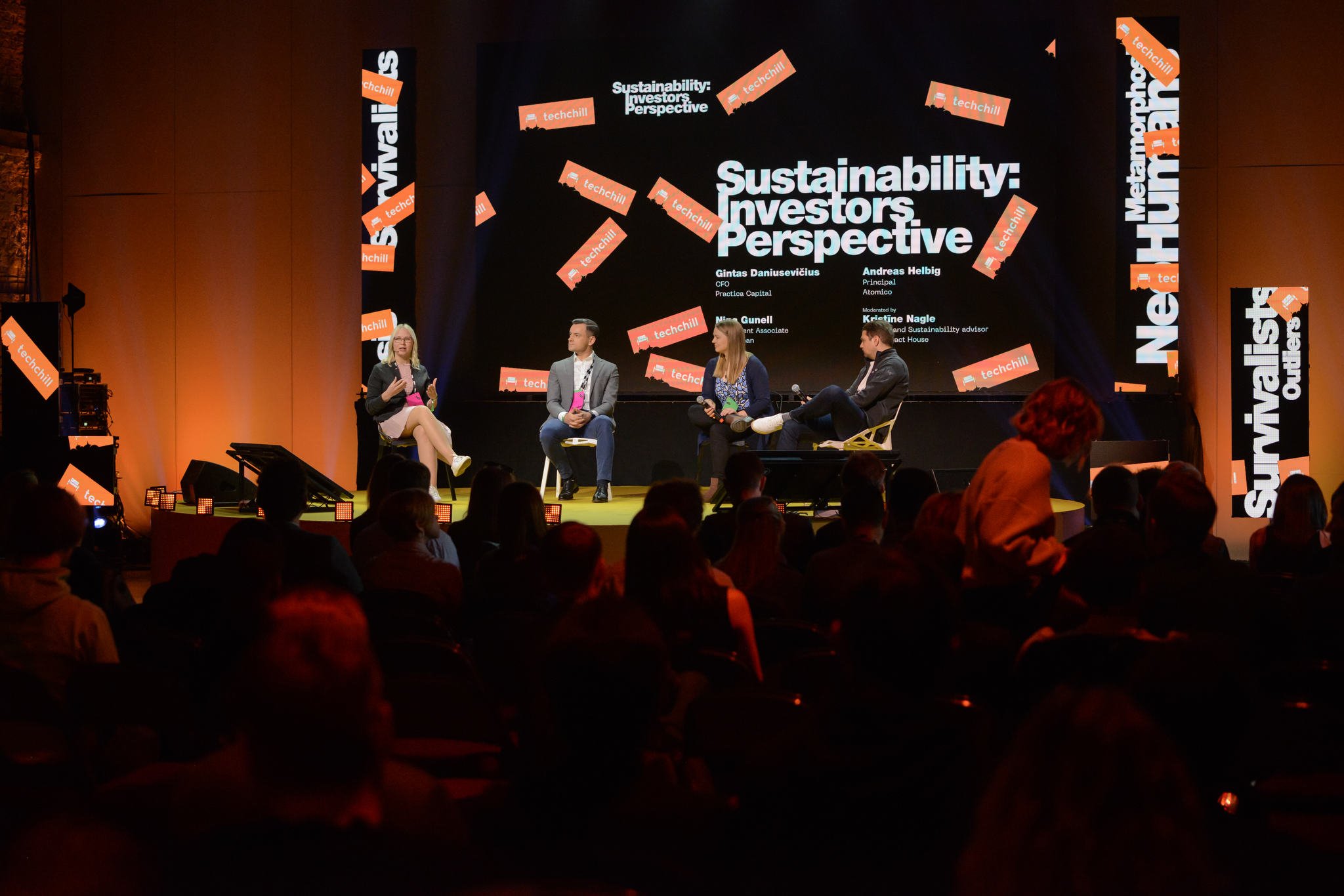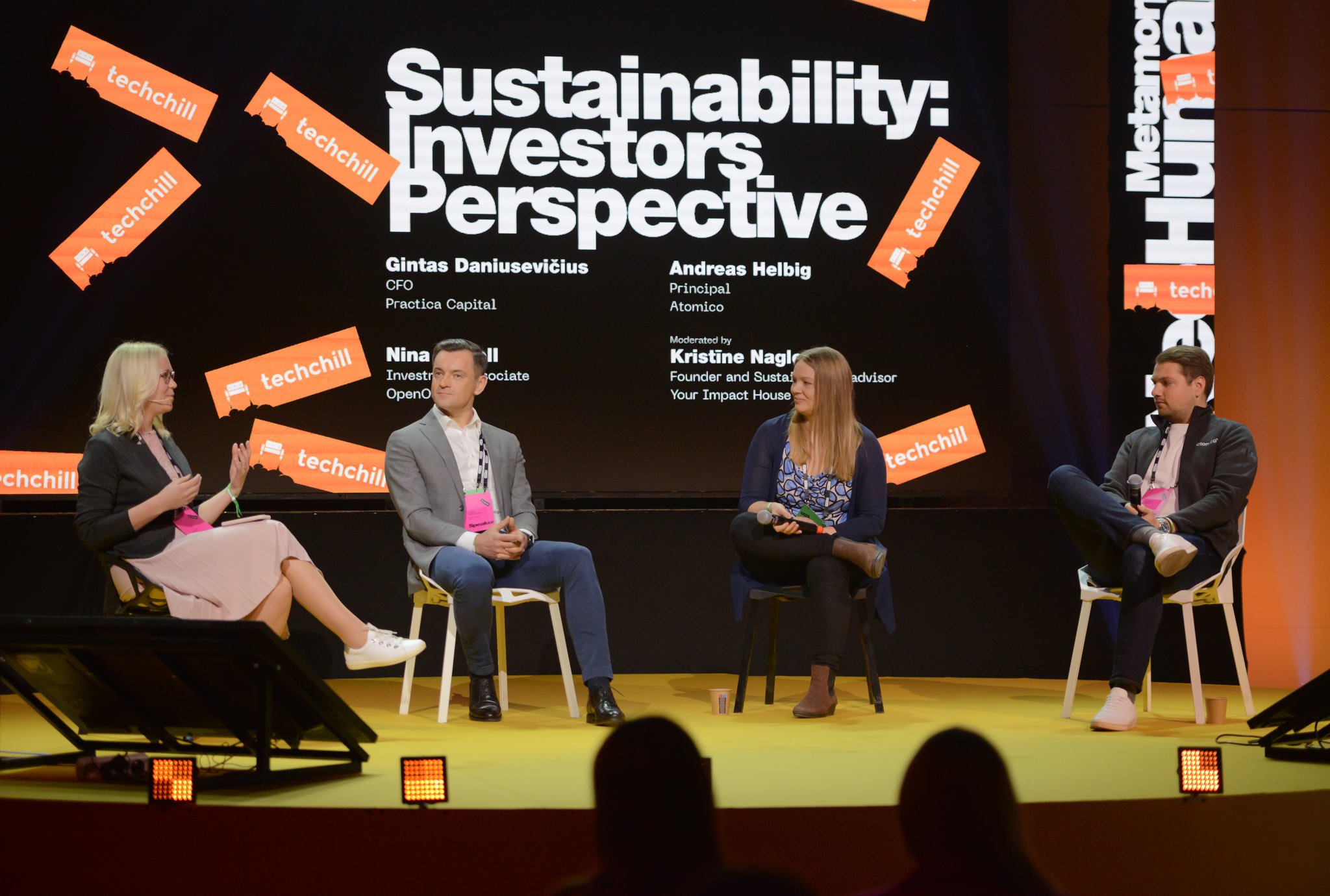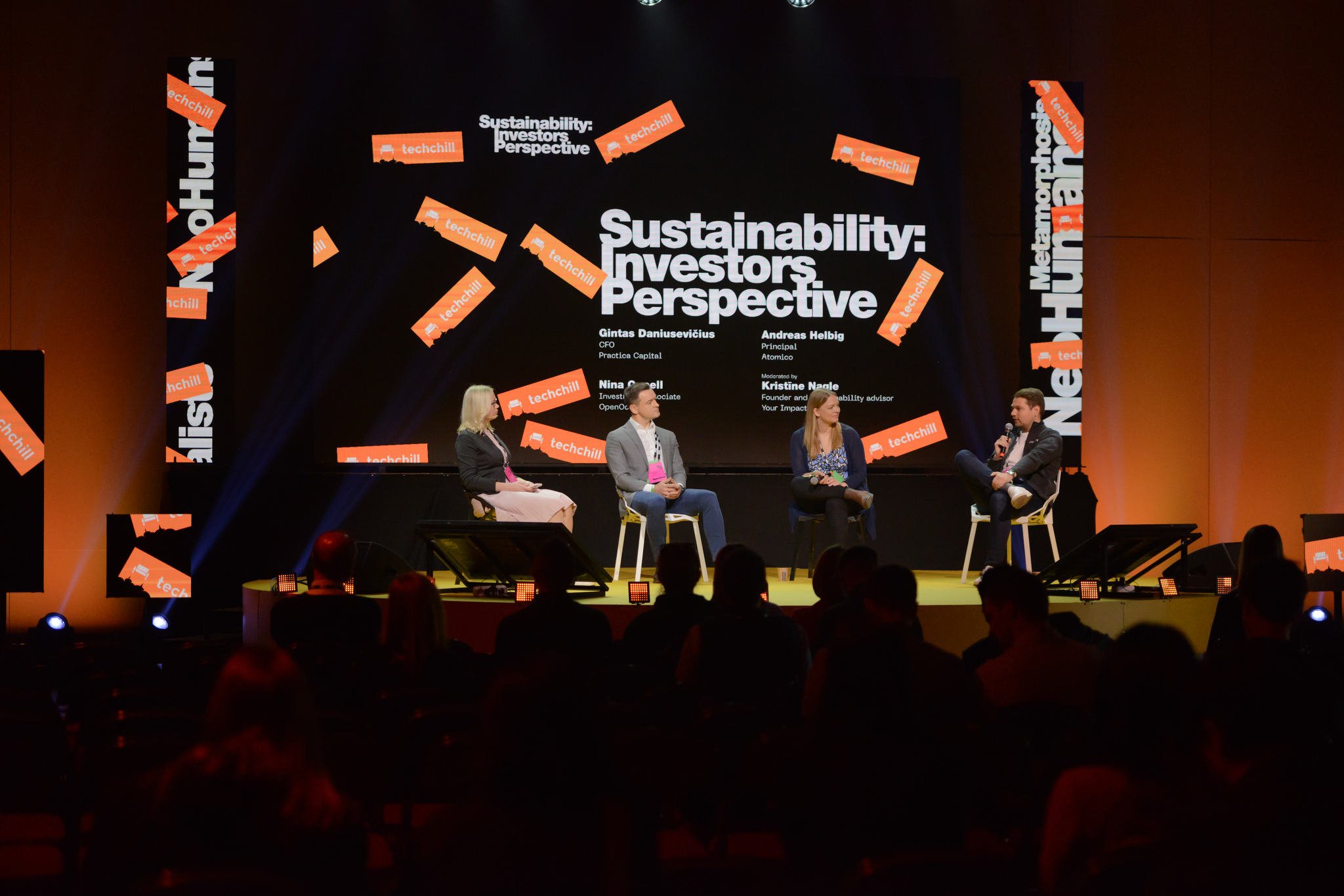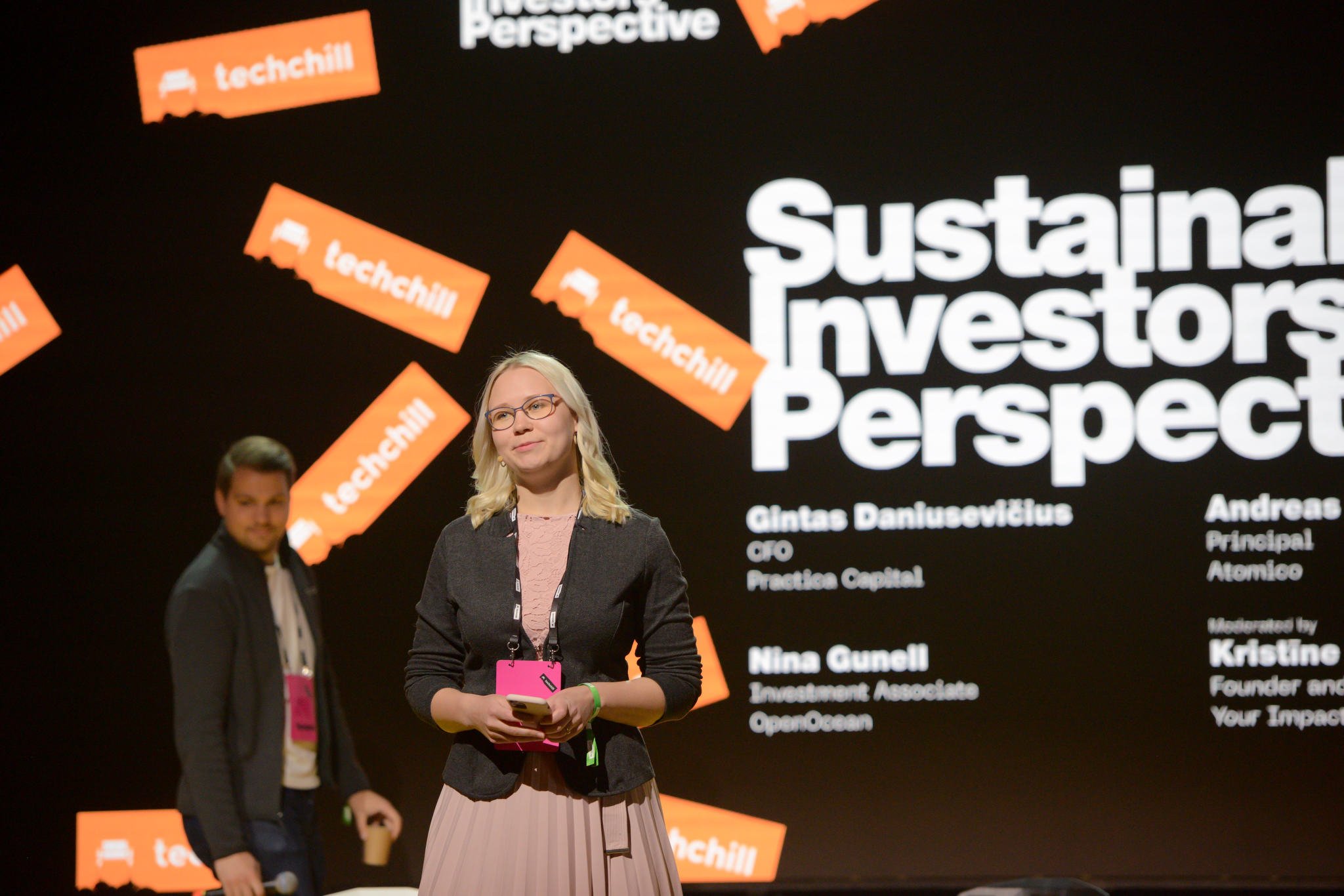Sustainability, Investor Perspective. Recap of #TechChill2022
TechChill is one of the leading tech events in the Baltics and Nordics. This April, it took place for the 10th year and that alone is a success. Beyond that, the event brought together 2300+ attendees from all over the world to my favorite city (also my hometown), Riga.
After being involved in hosting and organizing the event for years, this was the first time I joined the event with a Speaker badge around my neck. That happened thanks to some of the most prominent VC funds in Europe responding to my invitation to share their thoughts on sustainability. So here's a recap of what we discussed on the Founder Stage opening panel “Sustainability. Investor Perspective” with:
Gintas Daniusevičius, Partner and CFO at Practica Capital
Nina Gunell, Investment Associate at OpenOcean
Andreas Helbig, Principal at Atomico
The contents of this discussion should be especially valuable for startups and VC funds starting out on their journey to become more sustainable.
Before we go further, a huge thank you to the TechChill team for hosting this amazing event! I know what it takes to pull this off and couldn't be more proud to see you succeed.
Sustainability for investors. What's in it for them?
First and foremost, we must remember that the investment world hasn't become more responsible solely out of a change of heart. The EU Green Deal has set the direction for any additional regulations to ensure money flows toward companies that are “green”. The one regulation that is relevant to VC funds is SFDR (sustainable finance disclosure regulation). The main idea behind SFDR is that funds will need to disclose information on their sustainability practices (on a fund level) and their financial products (aka investments).
Nina Gunell, Investment Associate at Open Ocean:
“On top of the push from regulators, we see that now sustainability and profitability can, and should, go hand in hand. This has also been the conclusion in a majority of research papers in this area - companies with better sustainability practices also have better operational performance and lower risk. From an investor perspective, this translates to higher ARR and exit valuations. However, for us, the most important aspect is making a positive societal impact.”
Andreas Helbig, Principal at Atomico:
“For us, the motivation has been driven by two aspects: ethical (it's the right thing to do) and financial (ESG is a profit maximizer). For startups, it's sometimes still unclear how ESG maximizes profits, so here's how we see it:
ESG is a profit driver. For example, teams with strong gender & ethnic diversity drive 25% better financial performance (McKinsey & McKinsey) as products/services built by diverse teams target diverse consumers. In B2C businesses, sustainable values help attract millennial purchases (Harvard). While in B2B relations, we are starting to see a trend whereby corporate clients (banks, insurers, retailers) with environmental commitments require vendors to provide proof of ESG practices.
ESG is a talent strategy maximizer. It's easier to attract top talent for a company that has a purpose and strong values - 83% of Gen Z will consider a company's purpose when choosing a job (Conecomm). Anecdotally, we have also seen various senior top-notch operators only look for purpose-driven companies to join after a successful exit. ESG helps also with talent retention: 70% of Millennials declare a strong sustainability program influences them to stay in their organization (Morgan Stanley)
ESG is a capital enhancer. Many banks offer cheaper debt financing if ESG performances improve (Morningstar). And, what's especially important to startups - VCs are increasingly considering ESG KPIs as part of DD and are willing to pass on investment if notice any red flags in these areas.
ESG is an exit enabler. For any startup thinking of their IPO, it's important to understand that public markets are highly sophisticated & demanding of good ESG practices. When talking of buy-outs, corporate executives willing to pay up to 10% premium for companies with a positive ESG track record (McKinsey).
ESG is a risk reduction enabler. ESG helps a venture future-proof against new regulations, reputational risks, and operational costs
Investor progress on ESG integration
There's a saying about Riga city that it will never be completed. The same is true for the sustainability journey in companies - there's always more to be done. However, the VC funds joining the panel discussion regardless of being generalists have taken some serious steps in becoming more responsible.
Andreas Helbig, Principal at Atomico:
“It was important to get our own house in order before asking anything from startups. Our team has been working on improving our own diversity. Currently, our investment team is 59% women, up from 20% in 2017 and 44% of our investment partners are women. We have also reached a point where our office is carbon neutral and we've set in place a net carbon-positive strategy. Most importantly, 52% of our investments have been made in companies with at least 1 diverse founder across our 5 funds and angel program investments.”
Gintas Daniusevičius, Partner and CFO at Practica Capital:
“We are the signee of PRI (Principles for Responsible Investment). We have finalized our ESG policy, Due Diligence checklist, and the performance tracking scorecard. Our focus is on the things we can influence the most - Governance and Social matters like diversity.”
Nina Gunell, Investment Associate at Open Ocean:
“ESG has been high on our agenda for several years. It is part of our deal evaluation and DD process, and we also have a yearly ESG survey to track the overall level across the portfolio. But the most important are the achievements accomplished by our portfolio companies.”
How investor ESG affects startups
Nina Gunell, Investment Associate at Open Ocean:
“As for most other forerunner VCs, our next fund will be so-called “light green”. This will increase the amount of reporting we require from our portfolio companies. Assuming nothing changes in the SFDR regulation, companies will need to track and report on some of the 18 sustainability metrics. For the metrics that are the most relevant to their business (we estimate 6-8 would be the most for a typical for a software company), the company will need to provide specific actions to improve their performance.
Andreas Helbig, Principal at Atomico:
“We believe all ventures, whether building an impact product/service or not, should adopt relevant ESG practices in order to reduce potential risks (eg: regulations, climate risks) and maximize opportunities (eg: attract new categories of customers with inclusively built products, win corporate tenders thanks to good environmental performances). Given the new paradigm shift in the market, ESG practices should now be seen as best business practices applicable to any business.”
Gintas Daniusevičius, Partner and CFO at Practica Capital:
“I think that in a couple of coming years everyone will be expected to take action – startups not excluded. I think it means that given the current geopolitical and climate situation the startups that are not considering their business ESG metrics and are choosing investors that can’t help them succeed on their ESG journey will become obsolete in three to five years. If now we still see startups that are not putting much thought into ESG raising Series A or even B rounds – in the future will have problems raising even the Seed rounds.”
Advice for startups on the sustainability journey
Gintas Daniusevičius, Partner and CFO at Practica Capital:
“As early-stage entrepreneurs, you are in a great position to create something good from the start – good for nature, good for people, good for your country. Establishing relationships and partnerships that help you succeed on this journey are as important as ever.“
Nina Gunell, Investment Associate at Open Ocean:
“Don’t view ESG as a black or white. Don’t stress that you need to have everything in place at once. Like with your product, make a realistic roadmap on what you aim to have in place by when, and follow up on this.”
If you're working on building your company's sustainability strategy and need advice from someone who's done it before, check out other articles in this blog or book a call with Impact House for a free 30-min chat.
Sustainability is no longer luxury that only large corporations and public companies can afford. It's part of any business, also yours. Scale the business. Scale the positive impact you create.



